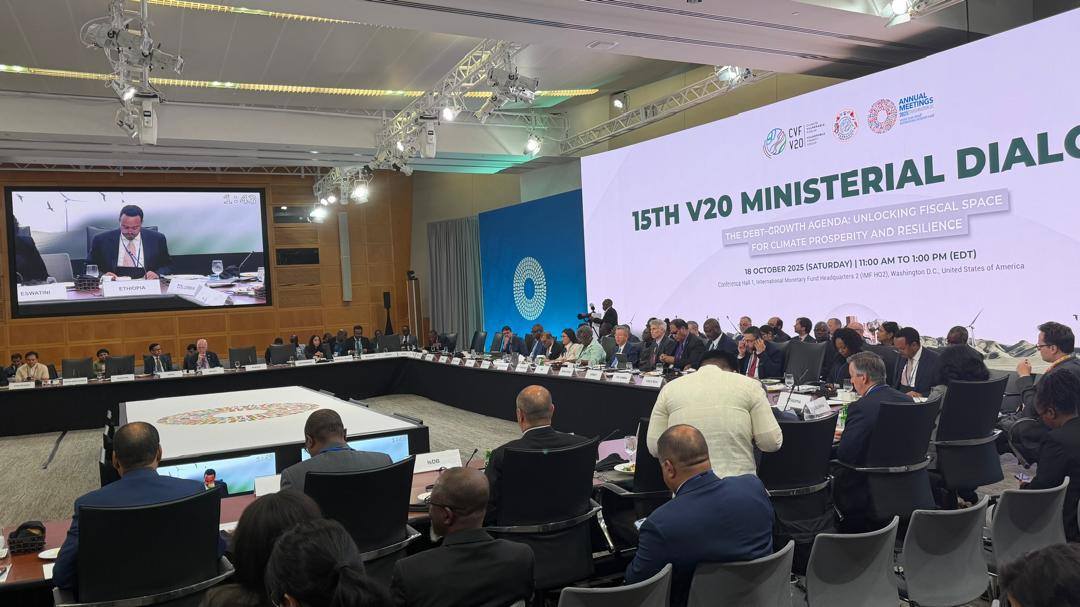Ethiopia’s Finance Minister Calls for Enhanced Support for Countries Facing Debt, Climate Risks - ENA English
Ethiopia’s Finance Minister Calls for Enhanced Support for Countries Facing Debt, Climate Risks

Addis Ababa, October 19, 2025 (ENA) -- Ethiopia’s Finance Minister Ahmed Shide reiterated the need for a more responsive and inclusive global financial architecture that effectively addresses the priorities of developing and climate-vulnerable nations.
Minister Ahmed who participated at the V20 Ministerial Dialogue at the IMF Headquarters in Washington, D.C., also held productive bilateral engagement with Dr. Sania Nishtar, Chief Executive Officer of Gavi, the Vaccine Alliance, on the sidelines of the World Bank–IMF Annual Meetings.
Ahmed highlighted the urgent challenges confronting climate-vulnerable countries that are increasingly exposed to severe climate-induced shocks — including droughts and floods — which place growing pressure on public finances.
These climate vulnerabilities, coupled with rising debt-servicing obligations, threaten to erode hard-won development gains and undermine resilience-building efforts, he noted.
The Minister further emphasized that Ethiopia has positioned itself as one of Africa’s pioneers in pursuing a low-carbon and climate-resilient development pathway.
He underscored the country’s flagship initiatives, including the Green Legacy Program to restore and protect forests for their economic and carbon sequestration benefits, with broad public participation and championed by Prime Minister Abiy Ahmed.
The expansion of renewable energy generation, with Ethiopia’s current energy mix already 95% sourced from renewables; and the government’s recent policy shift toward electric mobility as part of its broader green transition agenda, he added.
Reiterating the need for a more responsive and inclusive global financial architecture, the minister called for greater access to concessional financing and the scaling up of climate-specific grants to enable countries to invest in adaptation and resilience without worsening their debt burdens.
He also stressed the importance of innovative financial instruments, such as debt-for-climate swaps, to create fiscal space while advancing environmental and social objectives.
The V20 Ministerial Dialogue, organized by the Vulnerable Twenty Group of Finance Ministers (V20), serves as a key platform for advancing reforms in the global financial architecture and amplifying the collective voice of climate-vulnerable economies.
Meanwhile, the Minister held a productive bilateral meeting with Dr. Sania Nishtar, Chief Executive Officer of Gavi, the Vaccine Alliance.
The discussions focused on strengthening partnerships to ensure the sustainability of Ethiopia’s health infrastructure and immunization programs.
During the meeting, the Minister expressed appreciation for Gavi’s longstanding support to Ethiopia’s health sector, noting that immunization remains a central pillar of the country’s health strategy and a vital investment in human capital development.
He also highlighted recent national achievements, including successful measles and polio vaccination campaigns that reached tens of millions of children, as well as significant progress under the “Big Catch-Up” initiative, which has reached nearly one million previously unvaccinated children.
Dr. Nishtar commended Ethiopia’s leadership in advancing public health on the continent, including its contributions to the Africa CDC, and congratulated the country for attaining WHO Maturity Level 3 in health system performance.
She reaffirmed Gavi’s commitment to deepen collaboration with Ethiopia.